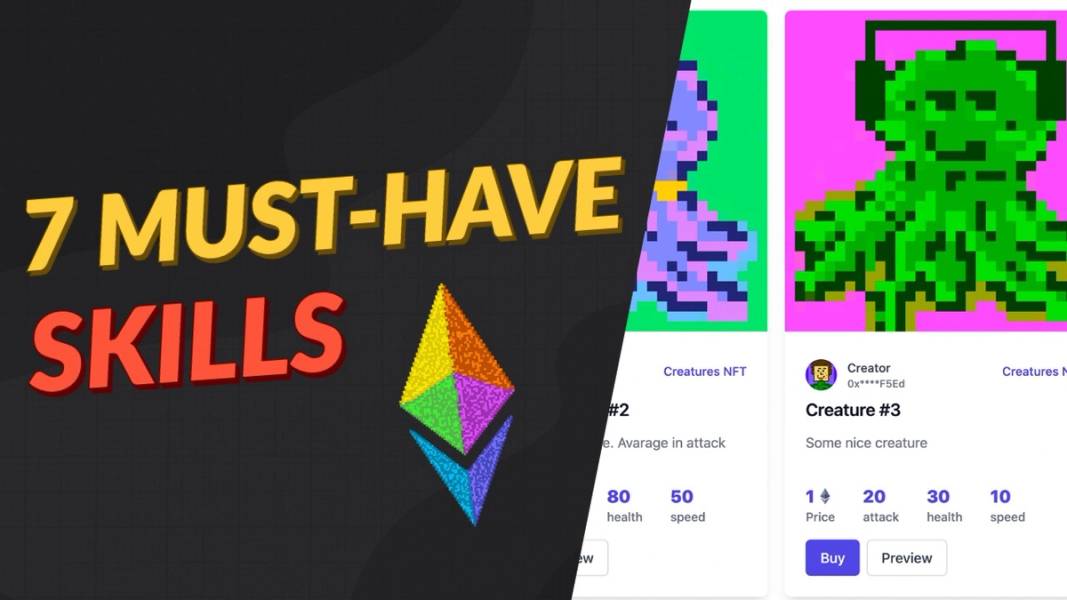Blockchain development is indeed a highly sought-after, hands-on technical skill. The blockchain technology market is expected to grow at a CAGR (compound annual growth rate) of 85.9% from 2022 to 2030. As the popularity of blockchain applications skyrockets, the demand for skilled blockchain developers also rises.
Aspiring developers need to look no further than these skills to have a rewarding career in the blockchain space. Whether you are a beginner developer, a professional looking for a career change, or simply looking to upskill yourself, you can significantly benefit from learning about this disruptive technology. This is the perfect time to capitalize on the booming market space, with IT giants like Samsung, IBM, etc., offering incredible career opportunities for blockchain professionals.
This article will explore 7 essential, industry-standard skills that blockchain developers must aim to master.
Resources
Eincode Academy’s Solidity & Ethereum in React: The Complete Guide
7 critical skills needed to become a successful blockchain developer
- Blockchain fundamentals
- Programming language basics
- Working on smart contracts
- Cryptography principles
- Data structures and algorithms
- Decentralization and distributed systems
- Frontend frameworks
1. Blockchain fundamentals
Aspiring blockchain developers must possess fundamental knowledge about blockchain and its workings. This includes learning about decentralization, the architecture of a blockchain network, different parts in a network like nodes or blocks, techniques like mining, etc.
Additionally, developers require knowledge about the different blockchain architectures and how they act as a solution for specific problems. Depending on the scenario, a developer might have to build a private network managed by a sole entity. This public network gives equal privileges to everyone in the network or a consortium network with multiple authorities.
Fundamentals also extend to learning about Ethereum — an open-source, decentralized blockchain network. Ethereum enables the development of smart contracts and DApps, eliminating issues like fraud, third-party interference, and downtime.
2. Programming language basics
When beginning your blockchain development journey, it is preferable to be familiar with at least one high-level language. Building complex blockchain networks require coding knowledge, especially when writing code-based smart contracts.
Solidity is one of the preferred languages for this purpose. It is an OOP (object-oriented programming) language utilized to construct and design smart contracts on blockchain platforms. You will quickly pick up Solidity if you are familiar with Python, C++, or Javascript. Many online courses teach Solidity fundamentals to developers.
3. Working on smart contracts
Smart contracts are a crucial part of blockchain development. They are essentially protocols or agreements executed when a particular business logic or condition is met, satisfying all involved parties and eliminating the need for an intermediary. It is a code agreed upon by every member of the network. Smart contracts play a massive role in building decentralized apps that are reliable and secure.
Since smart contracts are automatically executed lines of code, their code is kept public to avoid future problems. As a blockchain developer, you will be required to write code that ensures a blockchain network's proper functioning.
4. Cryptography principles
Security is an essential feature of any blockchain network. Cryptography itself deals with protecting data sent from one point to another via encryption and decryption methods. Knowing basic cryptography principles and techniques to make data transactions using a blockchain network like those employed in cryptocurrency is vital.
By studying cryptography, developers will learn about wallets, keys(public and private), widespread encryption and decryption techniques, and more. Cryptographic concepts such as digital signatures, RSA algorithm, hash functions, etc., add to the knowledge of blockchain development.
Since keeping the data within a blockchain system safe and secure is of utmost importance, cryptography is an essential concept to grasp to improve the reliability and accuracy of the system.
5. Data structures and algorithms
Blocks or nodes in every blockchain network follow data structure rules and architecture. Every developer must learn about data structures and algorithms. They are a crucial aspect of programming and blockchain development and are required to develop an immutable and efficient system.
Data structures like hash trees or Merkle trees are essential for transaction purposes in a network. Verifying and synchronizing the correct data for all nodes across the network is critical for all blockchain networks and is achieved through complex structures holding this data. Developers must master various data structures — graphs, heap, binary trees, linked lists, etc.
Although it may be a complex concept to grasp, it is a necessary skill that cannot be overlooked.
6. Decentralisation and distributed systems
Next, every blockchain developer must understand the functioning of distributed systems and networks. Since blockchain networks are distributed, the same knowledge is critical when designing complex networks.
Similarly, blockchain technology follows the decentralized approach to transferring information. No one entity has the central authority or power in the system since everyone enjoys the same access throughout the network.
For instance, DApps or decentralized applications are Ethereum applications that run on a peer-to-peer network and fuse smart contracts with a user-friendly interface. And knowledge of creating the same is a must to ace blockchain development.
7. Frontend frameworks
Lastly, frameworks like Next JS and libraries like React are excellent add-on skills to possess when designing user-friendly applications. Basic HTML and CSS skills are also good to have.
Familiarity with frontend integrations, along with a deep knowledge of the backend of a blockchain network, is a powerful combination to make any developer stand out in the vast sea of competition.
In the end
Now is the best time to master blockchain development via various readily available courses.
Before you get overwhelmed, here’s a proficient recommendation — Eincode Academy’s Solidity & Ethereum in React: The Complete Guide. The course is efficient and covers the fundamentals, enabling students to create two real-world applications during the course itself — faucet and marketplace application.
The faucet application answers what Ethereum (transactions, blockchain) is, what is EVM (bytecode, storage), how to create smart contracts and DApps, and how to integrate smart contracts with React. While the marketplace application teaches Next js(SSR) integration with Web3 and Blockchain, creating a more complicated Smart Contract, email hashing and order verification feature, testing solution (tests will cover every feature of the smart contract), and pagination and filtering of the orders.
Besides the technical skills mentioned in detail, blockchain developers must also possess some vital non-technical skills such as curiosity, determination, and tenacity to enter and prosper in this competitive field.

